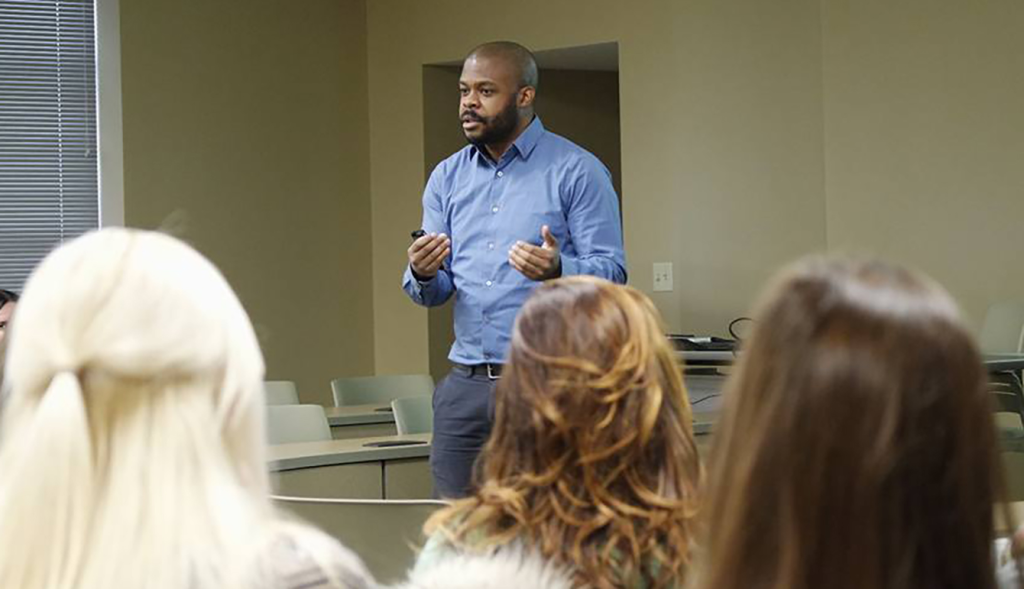
Part of the ASH Scholars Program, the Minority Focused News as a Locus of Empowerment research team investigates the manners in which news websites and streaming platforms that serve under-represented and marginalized populations provide a benefit to society.
The team was created in 2019 and undergraduate students at the University of Missouri who participate in the research seek to understand how identity-focused content serves as a safe space for those affected groups. It’s work that Julius Riles, an associate professor of communication at MU, had admired since its inception.
Riles joined Mizzou in 2016, bringing with him a variety of research interests, primarily related to the study of the interplay between media use and social relationships. While Riles was hopeful to eventually lend his expertise to the Minority Focused News team, the opportunity finally presented itself a couple years ago, when he was able to join Chris Josey as co-lead of the group. Josey is an associate teaching professor of communication at Mizzou.
“I was always fascinated by their work, as it was right in my wheelhouse,” said Riles who is also an affiliate faculty member in the Mizzou Honors College. “When a faculty spot opened, I was more than willing to step in, and it’s been incredibly rewarding to work with them. We have great engagement across the board and such rich conversations. There are a variety of perspectives, too, which is important to have.”
Riles developed a passion for communication as he was working toward his psychology degree at the University of Illinois Urbana-Champaign. He ended up staying at Illinois for his master’s degree and Ph.D., both coming in communication.
“When I was wrapping up my bachelor’s degree, I realized I was taking a lot of electives that were focused on studying media messages and media psychology,” Riles said. “I was really enjoying those courses and they drew me toward communication. Plus, I was learning from some really great people who were working on interesting projects. It all came together nicely.”
As Riles was finishing his Ph.D., he received a message from Lissa Behm-Morawitz, professor and chair in the Department of Communication at Mizzou. There was an open position within the department and Behm-Morawitz was curious to see if Riles would be interested in joining the team.
“When I came and visited Mizzou, I was amazed with how supportive everyone was,” Riles said. “They were also asking the kind of questions that I was curious about. It was obvious that Mizzou was going to be a place where I could grow. Plus, I was arriving at a time when important conversations were happening across campus, and I knew I could contribute to those conversations. I felt like I was going to join a place where I would be valued in terms of the perspective I was bringing.”
At Mizzou, Riles has researched a variety of important topics. He’s shared that work with Mizzou students, too, providing them with real-world examples in the classroom. Along with those topics, they discuss themes centered around parasocial relationships, and how messages of mental illness or criminalized racial depictions influence how individuals feel about those groups.
“The questions we ask students have massive real-world implications and it’s utterly fascinating,” Riles said. “It’s easy to tailor what we’re examining back to life experiences. It’s really interesting, as we’re all navigating these types of questions every day. I never lose passion for what I’m doing because of these interactions.”
The ASH Scholars Program, a unique collaboration between the Mizzou Office of Undergraduate Research and the Honors College, has allowed Riles to explore important questions in even greater detail.
“It’s been so rewarding to work with the ASH students,” Riles said. “What I enjoy about the team now is that we’ve reached a place where the students are developing their own research. They’re asking vital questions that we’re getting to explore.”
Riles added that funding opportunities for students to gain research experience within the arts, humanities and social sciences is incredibly important. It’s a major reason why Riles is so supportive of the ASH Scholars Program.
“This program is one of the best opportunities Mizzou has to offer,” Riles said. “Students have research interests, no matter what their major is. It’s amazing that they can pursue those interests – and I hope that support continues. The work being done allows them to grow in numerous ways.”